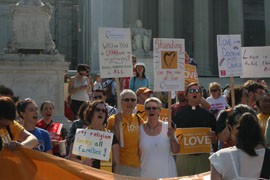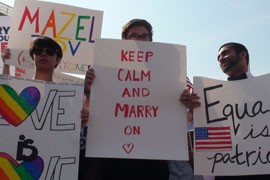Cronkite News has moved to a new home at cronkitenews.azpbs.org. Use this site to search archives from 2011 to May 2015. You can search the new site for current stories.
After Supreme Court rules on gay marriage, fight heads back to the state
WASHINGTON – The Supreme Court’s rulings on same-sex marriage are not likely to have a direct effect on states that ban gay marriage, like Arizona, where both sides said they now expect the fight to resume.
A sharply divided court said Wednesday that a federal law declaring marriage as being a union between one man and one woman – despite what different state laws may say – is unconstitutional.
In a separate decision, the court refused to act on a lower-court ruling that blocked enforcement of a voter-approved California constitutional amendment that also limited marriage to heterosexual unions.
“Basically what it (the Supreme Court) said is that the issue is up to us,” said Erin Ogletree Simpson, co-chair of Equal Marriage Arizona. “Now it’s up to all of us in Arizona to bring equal marriage here.”
Cathi Herrod, president of the Center for Arizona Policy, agreed that the debate will go forward in the state. But the agreement stopped there.
For Herrod, an opponent of same-sex marriages, the bottom line is that the court “did not find a constitutional right to same-sex marriage.”
Still pending as the court finished its work for the summer Wednesday was an Arizona law that has been challenged as discriminatory by gay-rights advocates.
That case, Brewer v. Diaz, challenges the state law prohibiting domestic partners of state employees from getting the employee’s benefits. State officials have said the law – known as Section O – was a cost-saving measure that applies to unmarried gay and straight couples, but gay-rights groups said it discriminates against them because Arizona law bans them from marrying to solve the problem.
Lower courts have blocked the law and the state appealed to the Supreme Court. But the high court has neither accepted nor rejected the case, leaving it in limbo while it considered the other cases.
Attorneys said the court could issue an order in coming days on Brewer v. Diaz.
Tara Borelli, the attorney representing the state employees suing Gov. Jan Brewer, said there is “likely an equal protections violation” in Section O because gay workers cannot marry and cannot qualify for state benefits that married couples receive.
The Supreme Court’s ruling Wednesday on the federal Defense of Marriage Act turned in equal protection for same-sex couples, but Borelli said the legal issue being challenged in Section O is different.
The DOMA decision “has to do with states where couples are already married and the federal government needs to recognize it,” she said. In the Arizona case, the issue “is that couples need this alternative channel to equal family coverage, because they can’t marry.”
Lawrence J. Joseph, an attorney who filed a brief for the Eagle Forum in support of Arizona in the Section O case, called it a case of “disparate impact.” He said same-sex couples cannot get married in Arizona because of a constitutional amendment, not Section O.
While the court’s rulings Wednesday stopped short of recognizing a right to same-sex marriages, supporters said they were energized by the decisions and optimistic about the future.
“Clearly the community is excited, we’re energized,” said Rebecca Wininger, president of Equality Arizona. “For once we feel like we’re all on the right side of this fight.”
She said the fight needs to continue as long as some states treat gays like “second-class citizens” by banning same-sex marriages.
In its 5-4 opinion overturning the federal Defense of Marriage Act, the court said the law denied gay couples the equal protection they are due, by singling them out and deeming “that their marriage is less worthy than the marriages of others.”
The law limited marriage to the traditional definition for purposes of federal benefits and laws, affected everything from a same-sex spouse’s ability to get benefits, enjoy tax breaks and be buried next to their spouse in a veterans cemetery. It was brought by a New York woman who had to pay $363,053 in estate taxes because the federal government did not recognize her marriage to her late wife under DOMA.
Most of the Democrats in Arizona’s congressional delegation quickly embraced the ruling Wednesday.
“The decisions made by the Supreme Court today reaffirm those rights and move our country closer to fulfilling the promise in our Constitution of equal rights for all,” said Rep. Raul Grijalva, D-Tucson, in a statement.
But Rep. Trent Franks, R-Glendale, echoed the dissenting justices, who said the court lacked the authority to rule in the DOMA case.
Franks said in a prepared statement that the court has “more and more become the default arbiter of all major issues in America.” Wednesday’s decision “will undermine the traditional family” and lead to a “tyrannical judicial oligarchy,” his statement said.
Rep. Kyrsten Sinema, D-Phoenix, called the DOMA ruling “historic progress,” but said “that more work remains to be done.”
“Every family in our country deserves the same security and protection afforded to families in California,” Sinema said.
Ogletree Simpson said gay-rights supporters are ready for the fight.
“We’re encouraged because we see the swing going in the direction of equal marriage throughout the country, and in Arizona too,” she said.











